There’s many free and paid options to learn Python out there.
Codecademy’s Learn Python 3 is one of the most popular courses on the web.
But is it worth investing your time and money into?
That’s what we’ll look into in this review.
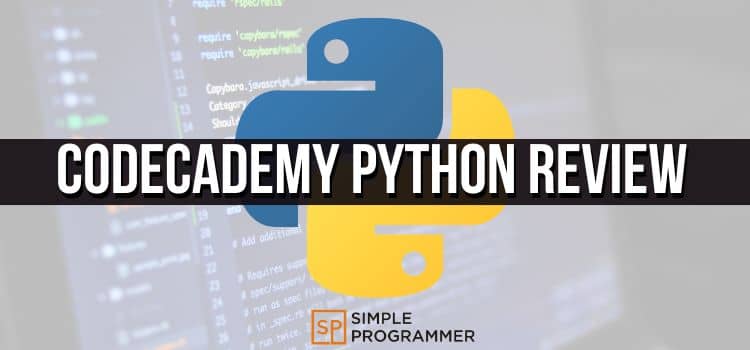
I’ll go over:
- what exactly is in the course
- how the material is presented and how the platform works
- my opinion on Codecademy as an effective way to learn Python
so you can make an informed decision about giving it a try.
Reviewing Codecademy’s Python track (as a course creator)
I’ve taught Software Development for many years, and I ended up creating over 50 courses on another popular code-learning platform. In my view, if you’re paying for a course, it should:
- save you time through a streamlined learning process
- supply quality content, present it well, and be intuitive to use
- encourage practical application vs passive “learning”
I’ll use my experience creating online coding courses to see whether Codecademy’s Learn Python 3 is up to standard.
Is Codecademy actually good for Python?
The quality of Codecademy’s material is comparable to what you’ll find in the official documentation or a popular book.
Compared to learning from a book or free tutorial, the platform does offer an advantage in that it is so well-structured and hands-on. You can learn something new and apply it right then and there – no switching from documentation or book to code editor required.
The hints, cheat sheets and forums – something you don’t get everywhere – are also helpful when you get stuck.
In my opinion, Codecademy is indeed one of the best options to learn Python from scratch and practice your skills.
Is it good for beginners?
Codecademy gives you one small piece of a new concept at a time, and then has you apply it right away by writing your own code – which is a good way for a beginner to start learning Python.
When you’re just starting out, it’s important to both have some hand-holding through a clear roadmap, and to take action on everything you’re learning. It’s not enough to just absorb and cram in information.
Beginners need to do coding to really get coding.
Which are the best Python courses on Codecademy?
Learn Python 3 is the best course I’d advise you to start with, and then you can move on to Codecademy’s Advanced Python 3, as well as the Python for Data Science track if you’re planning on using Python for that purpose.
How long does it take to finish?
Codecademy specifies the scope of Learn Python 3 at around 25 hours of study time. You can of course do it at your own pace, so whether you do it in a week or over the course of 1-2 months is up to you.
How long the course ends up taking you will also depend on whether you have some experience programming, or maybe even know some Python already.
That being said, it is an entry-level course, so it shouldn’t take you many months to go through if you do decide to put in a decent amount of time and effort.
Course features
Here’s how the Python course works: You’ll be learning Python fundamentals from the ground up, from Operators, to Variables, to Functions, to Data Types. The training is split into different modules, each containing lessons, projects and quizzes.
As mentioned, the focus with Codecademy is on you taking action, so you’ll be writing your own code in the built-in editor as you go along.
Modules inside Codecademy’s Learn Python 3
The course has 10 different modules with each covering different Python concepts.
1 Hello World
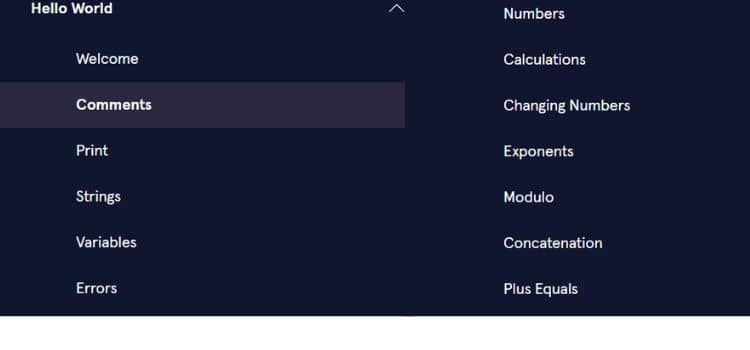
The Hello World module teaches you how to generate print output while going into concepts such as Strings, Variables, and Concatenation.
2 Control Flow
Inside the Control Flow part of the course, you’ll learn how to use if and elseif statements, Operators, and Boolean values.
3 Lists
These lessons are all about the List data type in Python, how it works and how to use it.
4 Loops
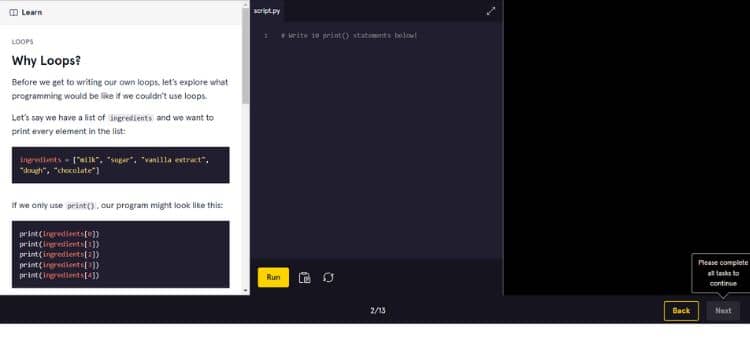
For, While and nested Loops are the topic of this module.
5 Functions
Halfway through Learn Python 3, you’ll get an introduction to Functions, Parameters, and Variables.
6 Strings
Strings are characters strung together, which you’ll learn about in the sixth module.
7 Modules
Modules are files containing definitions and statements. This module shows you how to import and implement modules in your Python code.
8 Dictionaries
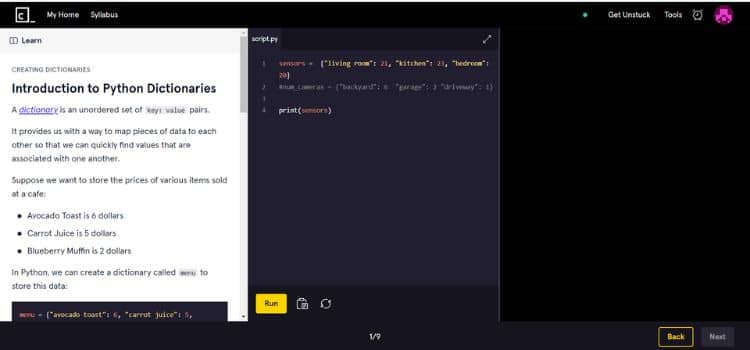
In the module about Dictionaries, you’ll get to know this data structure which associates keys with values.
9 Files
Text files and binary files are explained in the penultimate module inside Codecademy’s Learn Python 3.
10 Classes
Finally, you’ll learn how to instantiate and work with classes in Python.
Module practice
With each module you get the option to revisit the main points addressed in the lessons. Module practice gives a quick review of the learnings, as another way to drill in a concept.
Cheat Sheets
If you’d like to digest the lesson contents in more of a blog-style format, Codecademy provides a cheat sheet at the end of every module.
Projects
Here’s something that sets Codecademy apart from other methods of learning Python: The course includes multiple projects – almost one for every module.
They tell you the aim of the project and provide you with some sample code to get you started. Then you’re asked to complete the project by coding out your own solution inside Codecademy’s integrated code editor.
If you get stuck, you can look at the “Get Unstuck” section, which has a video walkthrough of the whole project.
I love this functionality because you’re building something tangible instead of dealing only with single, separate concepts.
Quizzes
Quizzes are another way to spice up your Python learning journey and make it more interactive.
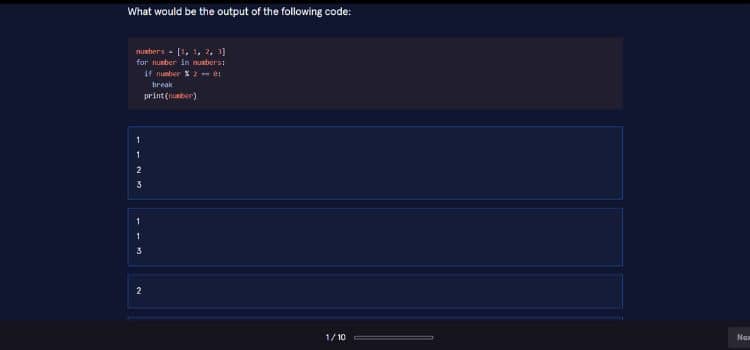
You get at least one of these in every lesson.
Code Challenges
These are not compulsory to get your certificate – but the Python course includes two sets of code challenges which you can use to practice what you’ve learned so far.
They give you some written instruction, and then you’re asked to write the code accordingly.
If you need assistance, you can reveal a hint. Once you’re done, you can run your solution, and check it against a solution the Software Engineers at Codecademy came up with.
Certificate of completion (optional)
If you were able to master every assignment in Learn Python 3, you can opt to get your Codecademy certificate.
These aren’t on the same level as a bootcamp certificate or similar, but if you’re someone who doesn’t have any proven experience yet, they can be something to add to your resume and social media profile.
Community
Codecademy has both a discord server and well-trafficked forums, where you can share your progress, ask questions, and be inspired by others.
Pros & Cons of Codecademy for Python
Pros
- The interactive learning environment and streamlined structure are motivating and make for quick progress
- The community aspect is a nice bonus
- The price is reasonable, especially if you choose just the Plus level, and opt for annual billing
Cons
- Codecademy isn’t the best resource for learning high-level theory and principles
- Certificates are not officially accredited
Pricing
Is Codecademy Python free?
The course Learn Python 2 on Codecademy is free, but Learn Python 3 is not. You need to have at least the Plus membership to be able to access the materials.
If you choose to purchase the Pro tier, you’ll also unlock the Computer Science and Data Science career paths, in which you gain general programming knowledge or advanced Data Analysis skills while using Python.
7-day trial
Fortunately, you don’t have to commit to a paid membership right away – you can test drive Codecademy’s Python trainings for a week, and then make a decision.
Final verdict – is Codecademy’s Learn Python 3 worth it?
Yes, I can recommend Codecademy as one of the best platforms to learn Python basics. I do believe you should start your own projects as soon as possible, and become even more of a self-reliant learner.
You should also learn high-level programming principles and read books.
But it makes sense to get your start with a guided resource like Codecademy – you’re far less likely to become frustrated and give up when you’re using such a gamified environment.
And with how their courses are structured, you can learn a lot of Python, fast.
FAQ
Will this get me a job?
Codecademy’s course can get you to a good level in Python programming – if you do all the regular coding tasks and complete the optional challenges as well.
You can call yourself a Python Developer after you’ve gone through the course. Will you be a complete programmer, though? No. You’ll still have a lot to learn, and learning never stops.
Can you get a job right away after the course? It’s possible, albeit not super likely. To increase your chances, consider this approach:
- Keep expanding your skills – maybe take CC’s Advanced Python next
- Specialize in something – like Back-End development, or Data Analysis with Python, for example
- Build up your developer portfolio with multiple projects using everything you’re learning
- Work on coding interview abilities: LeetCode-style questions and soft skills
Codecademy’s Learn Python 3 might not get you a job on its own, but if you play it right, it can be a major step moving you into your future as a professional Python developer.
